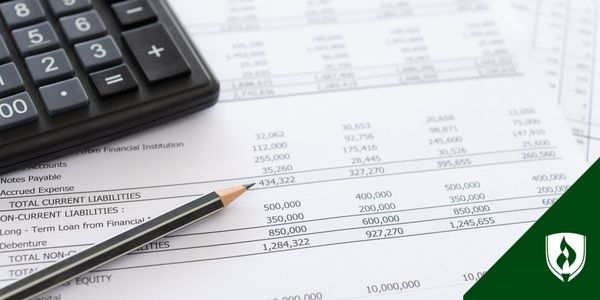How to Become an Accountant
05/22/2025

Whether you enjoy working with numbers, analyzing data, or solving problems, a career in accounting is a crucial role in managing finances for individuals, businesses and government agencies. If you are detail-oriented, organized, and interested in working with financial data, accounting might be a good fit for you. Learn the steps to prepare for an education, skills, certifications, and career options you may need to pursue your goals.
Steps to Become an Accountant
Step 1: Earn a Relevant Education
Education plays a key role in becoming an accountant. At Rasmussen University, you can pursue an online accounting degree to build on the skills necessary for a variety of accounting roles. These flexible programs may be completed in as few as 18 months, allowing you to gain essential skills quickly. You’ll also work with industry-standard software like QuickBooks® and Excel®.
Rasmussen University offers:
- Online Certificate1: Focus on areas such as tax preparation, financial management, and learning how to use computer applications like QuickBooks®.
- Online Associate Degree2: Gain foundational knowledge in accounting and business, computer programs, managing accounts receivable and accounts payable, and financial statements.
- Online Bachelor’s Degree3: Learn accounting skills, including managerial accounting, financial reporting, accounting reconciliation, payroll and bookkeeping. This program prepares students for the Certified Management Accountant® (CMA) Exam.
Rasmussen University accounting courses are not designed for any state-issued professional license of certification. These accounting programs do not meet all educational prerequisites for licensure as a Certified Professional Accountant (CPA) in any state.
Step 2: Build Essential Skills
Accountants need a combination of technical and soft skills to succeed. In addition to mastering industry-standard tools like QuickBooks® and Excel®, you will need a strong understanding of accounting principles and ethics.
Being detail-oriented and organized is crucial, as even the smallest mistake can have a significant impact. Communication skills are also important, as you’ll need to explain complex financial information to clients or non-technical colleagues who may not have the same background as you.
Step 3: Choose a Specialty or Career Focus
As you move through an accounting education, you may want to specialize in a particular area. Common accounting specializations include:
- Tax Accounting: Focuses on preparing tax returns and providing tax-related advice.
- Forensic Accounting: Involves investigating financial discrepancies and fraud.
- Managerial Accounting: Works with businesses to help them make informed financial decisions.
- Auditing: Ensures financial statements are accurate and compliant with regulations.
Your educational courses and career focus may help you align with your chosen specialty and prepare you with the skills and knowledge for a strong foundation in accounting.
Step 4: Consider Certification and Licensure
Many accountants pursue certification to build or enhance their skill sets. The most recognized certification is the Certified Public Accountant (CPA) credential. However, CPA licensure requirements vary by state, and obtaining it requires passing the CPA exam4.
The CPA exam consists of four sections: financial accounting, auditing and attestation, regulation, and business environment and concepts. After passing the exam, you’ll also need to meet the work experience requirements, which vary by state.
While Rasmussen University’s programs do not meet CPA licensure requirements, they can help prepare you for other certifications like the Certified Management Accountant (CMA®). To understand specific licensure requirements, refer to your state’s board of accountancy.
Step 5: Pursue Continuing Education
For those looking to further their careers, a master's degree or graduate degree could be an excellent next step. Some may choose to pursue certifications such as the Certified Management Accountant® or Certified Internal Auditor (CIA).
Rasmussen University’s accelerated master’s pathway5 allows you to take one MBA course as part of the accounting bachelor’s degree without additional tuition costs. This option lets you gain advanced knowledge and skills while completing your undergraduate degree, without the immediate commitment to graduate school.
Career Paths for Accountants
Accountants have a wide range of career paths to choose from, each offering its own set of challenges and rewards.
Here are a few roles you can pursue:
- Accountant: Manages financial records for individuals or businesses, prepares financial statements, and ensures compliance with tax regulations.
- Auditor: Specializes in reviewing and verifying financial records, typically working for government agencies, corporations, or auditing firms.
- Financial Analyst: Helps businesses and organizations make investment and financial decisions by analyzing market trends and economic data.
- Managerial Accountant: Works within a company to help analyze costs, create budgets, and improve financial efficiency.
Job Outlook and Growth
According to the Bureau of Labor Statistics, accountants and auditors are expected to see growth, projecting 6% growth6 from 2023-2033, driven by the need for businesses to manage financial data and comply with regulations.
As businesses and government entities continue to expand, the demand for accountants will remain high. Accountants are essential in ensuring that financial records are accurate and that companies comply with regulations, making this an integral role across industries.
Start Your Journey
Whether you're interested in financial accounting, tax accounting, or management accounting, pursuing an accounting degree at Rasmussen University can set you on the right path. The programs are designed to give you foundational skills, insight and experience.
Whether you choose to specialize in forensic accounting, work with government accountants, or prepare for the CMA® exam, Rasmussen University’s flexible online accounting programs may provide the foundational skills you may need to pursue your career goals.
Explore Rasmussen University's accounting degree programs7 and connect with an admissions advisor to start your accounting journey at Rasmussen.
The Certified Management Accountant® Exam program is not designed to prepare graduates for any state-issued professional license or certification. This program does not meet all educational prerequisites for licensure as a Certified Public Accountant (CPA) in any state. Each state determines its own requirements for licensure as a Certified Public Accountant (CPA). In addition to other requirements, most states require a bachelor’s degree and no fewer than 225 quarter credits (150 semester credits) of university coursework, specific in-field experience, and passage of the CPA licensing exam. Additional examination eligibility and licensure requirements exist. Please consult with your state’s board of accountancy or equivalent oversight agency for further details, as requirements may change at any time. This program has not been approved by any state board of accountancy or other professional licensing agency.
1Rasmussen University, Accounting Certificate, at https://www.rasmussen.edu/degrees/business/accounting/certificate/ (visited Mar. 24, 2025).
2Rasmussen University, Accounting Associate's Degree, at https://www.rasmussen.edu/degrees/business/accounting/associates/ (visited Mar. 24, 2025).
3Rasmussen University, Accounting Bachelor's Degree, at https://www.rasmussen.edu/degrees/business/accounting/bachelors/ (visited Mar. 24, 2025).
4National Association of State Boards of Accountancy, CPA Exam, at https://nasba.org/exams/cpaexam/ (visited Mar. 24, 2025).
5Rasmussen University, Accelerated Master's Pathway, at https://www.rasmussen.edu/degrees/accelerated-masters/ (visited Mar. 24, 2025).
6U.S. Bureau of Labor Statistics, Accountants and Auditors, at https://www.bls.gov/ooh/business-and-financial/accountants-and-auditors.htm#tab-6 (visited Mar. 24, 2025).
7Rasmussen University, Accounting Degrees, at https://www.rasmussen.edu/degrees/business/accounting/ (visited Mar. 24, 2025).



